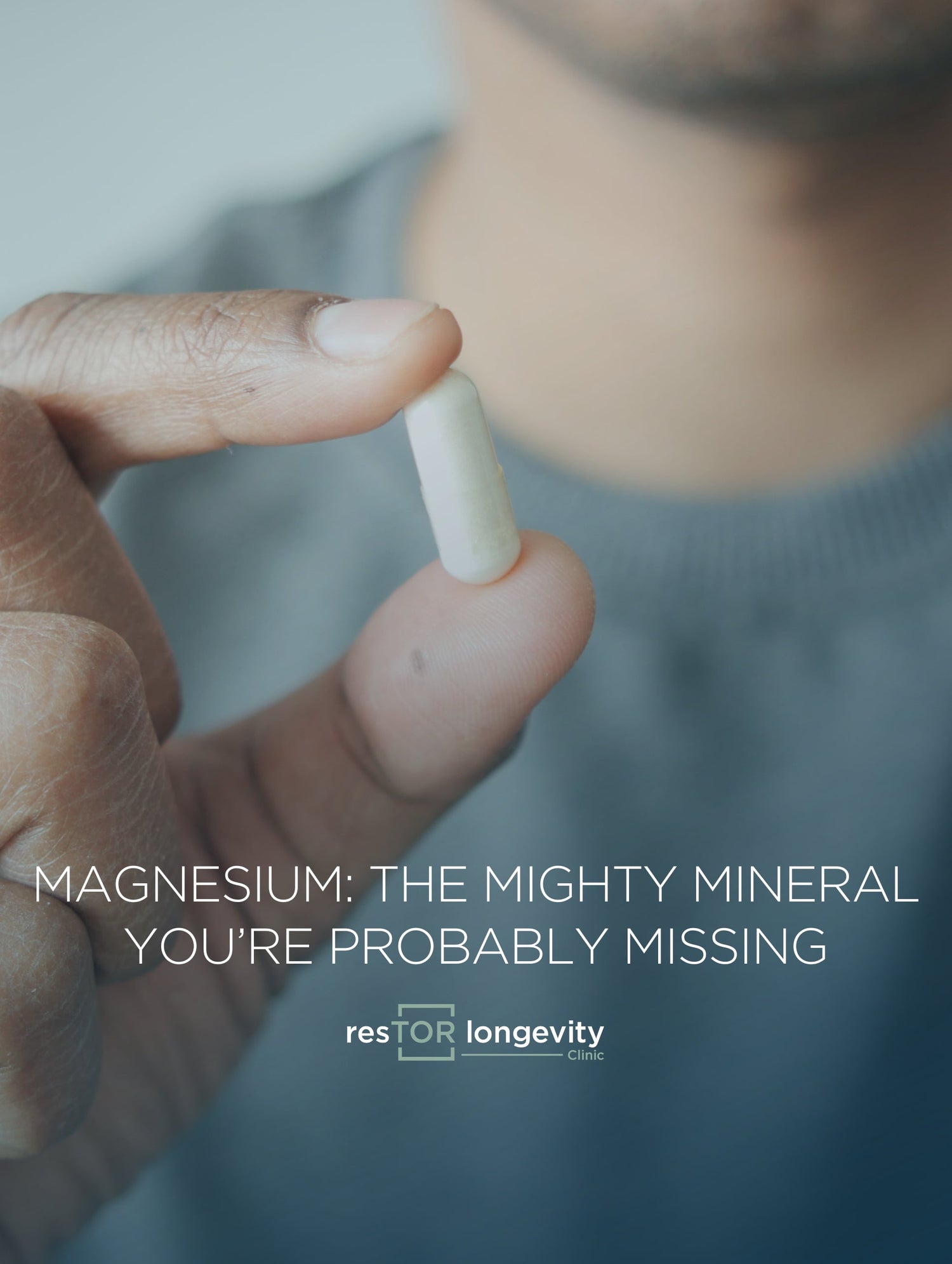Magnesium: The Mighty Mineral You’re Probably Missing
Despite being involved in over 300 enzymatic reactions in the human body, magnesium deficiency is one of the most common—and overlooked—nutritional issues today. At resTOR Longevity Clinic, we see this all the time: patients struggling with symptoms like fatigue, anxiety, poor sleep, and muscle cramps, only to discover that low magnesium levels are a hidden root cause.
Research suggests that up to 75% of people are not getting enough magnesium, and most have no idea. Why is this vital mineral missing from modern life—and what can you do to restore it?
Let’s break it down.
Why Magnesium Deficiency Is So Common
There are several reasons magnesium deficiency is so widespread—even in people who are eating what they believe to be a balanced diet.
1. Poor Dietary Intake
Modern diets tend to be high in processed foods, refined grains, and sugars—none of which contain much magnesium. On the flip side, magnesium-rich foods like leafy greens, nuts, seeds, beans, and whole grains are often under-consumed.
2. Soil Depletion
Even if you do eat healthy whole foods, you might not be getting as much magnesium as you think. Decades of industrial farming and soil depletion have stripped magnesium from our crops, meaning today’s spinach and broccoli may contain far less magnesium than they did 50 years ago.
3. Increased Loss Through Stress and Lifestyle
Chronic stress, caffeine, alcohol, sugar, and certain medications (like diuretics or proton-pump inhibitors) increase magnesium loss through urine. Add in the fast pace of modern life, and our bodies are constantly burning through their magnesium reserves.
4. Decreased Absorption with Age
As we age, our ability to absorb magnesium through the gut declines—even if intake stays the same. This makes magnesium optimization especially important for older adults and anyone concerned with longevity and resilience.
Why Magnesium Matters: 6 Critical Functions
Magnesium plays a central role in dozens of essential processes throughout the body. Here are just a few ways it supports your health:
1. Supports Brain and Nervous System Function
Magnesium helps regulate neurotransmitters like serotonin and GABA, which support mood, focus, and calm. Low magnesium levels are linked to increased risk of anxiety, depression, and neurological dysfunction.
2. Improves Sleep and Relaxation
Magnesium is often referred to as nature’s chill pill for good reason. It promotes deeper, more restorative sleep by calming the nervous system and supporting melatonin production. If you struggle with insomnia or nighttime muscle tension, magnesium may be a missing link.
3. Regulates Blood Pressure and Heart Rhythm
Magnesium helps control electrical impulses in the heart and blood vessels. It supports healthy blood pressure, stabilizes heart rhythm, and reduces cardiovascular risk. Many cases of irregular heartbeat (arrhythmia) have been tied to magnesium deficiency.
4. Prevents Muscle Cramps and Supports Recovery
Whether you’re an athlete or simply prone to muscle tension, magnesium helps relax tight muscles, improve circulation, and reduce post-workout soreness. It also assists in energy production at the cellular level.
5. Helps Control Inflammation
Magnesium acts as a natural anti-inflammatory agent by regulating immune response and reducing oxidative stress. Chronic low magnesium levels are associated with higher levels of C-reactive protein (CRP), a marker of systemic inflammation.
6. Supports Blood Sugar Balance
Magnesium improves insulin sensitivity and glucose metabolism, helping to prevent insulin resistance and type 2 diabetes. It's essential for anyone managing blood sugar, weight, or metabolic health.
How to Know if You’re Deficient
Magnesium deficiency often flies under the radar because early symptoms can be vague—fatigue, irritability, poor concentration, or cravings. More serious symptoms include:
-
Headaches or migraines
-
Constipation
-
Muscle twitches or spasms
-
Anxiety or depression
-
Irregular heartbeat
Standard blood tests don’t always reflect your true cellular magnesium status, since only 1% of the body’s magnesium is in the blood. At resTOR Longevity Clinic, we use advanced nutrient and intracellular testing to get a more accurate picture of your levels.
How to Restore Your Magnesium
If testing shows that your levels are low—or you’re experiencing symptoms—here’s how to optimize your magnesium intake:
1. Eat Magnesium-Rich Foods
Incorporate more of the following into your daily diet:
-
Spinach, chard, and kale
-
Almonds, cashews, and pumpkin seeds
-
Avocados
-
Black beans and lentils
-
Dark chocolate (70% cacao or higher)
-
Whole grains like quinoa and brown rice
2. Supplement Smartly
Sometimes food isn’t enough—especially when absorption is impaired or demand is high. We often recommend high-quality magnesium supplements, such as:
-
Magnesium glycinate – best for relaxation and sleep
-
Magnesium citrate – supports digestion
-
Magnesium threonate – crosses the blood-brain barrier for cognitive support
Our personalized protocols include clinically dosed, bioavailable forms of magnesium tailored to your needs.
Invest in What Your Body Needs Most
Magnesium is a simple, affordable, and science-backed way to support nearly every system in your body—from your brain to your heart to your metabolism. Yet it's one of the most overlooked minerals in modern medicine.
At resTOR Longevity Clinic, we help you uncover silent deficiencies and create a customized plan to restore optimal function from the inside out.
Schedule a consultation today and take the first step toward a more balanced, energized, and resilient you.



